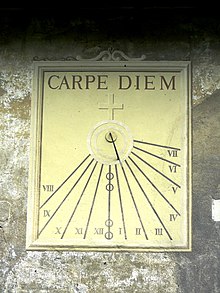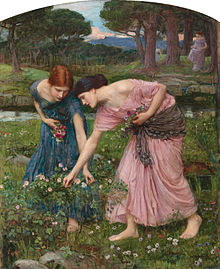Carpe diem: Difference between revisions
m Reverted edits by 50.75.60.244 (talk) to last revision by KTo288 (HG) |
No edit summary |
||
| Line 86: | Line 86: | ||
Strike while the iron is hot; |
Strike while the iron is hot; |
||
The early bird catches the worm. |
The early bird catches the worm. |
||
"YOLO" (You Only Live Once) |
|||
==See also== |
==See also== |
||
Revision as of 14:28, 1 May 2013

Carpe diem is a phrase from a Latin poem by Quintus Horatius Flaccus (65 BC – 8 BC), more widely known as Horace, that has become an aphorism. It is popularly translated as "seize the day". Carpe is the second-person singular present active imperative of the Latin verb carpō, which literally means "You pick, pluck, pluck off, cull, crop, gather, to eat food, to serve, to want", but Ovid used the word in the sense of, "enjoy, seize, use, make use of".[1] It is related to the Greek verb (carpoomae) καρπόομαι, (I grab the fruit, profits, opportunity), (carpos) καρπός=fruit of tree, of effort, etc. Diem refers to "day". Thus, a more accurate translation of "Carpe diem" would be "enjoy the day" or "pluck the day [when it is ripe]".
History
Source
Original usage from Odes 1.11, in Latin and English:
| Tu ne quaesieris, scire nefas, quem mihi, quem tibi | Don't ask (it's forbidden to know) what end |
| finem di dederint, Leuconoe, nec Babylonios | the gods have granted to me or you, Leuconoe. Don't play with Babylonian |
| temptaris numeros. ut melius, quidquid erit, pati. | fortune-telling either. How much better it is to endure whatever will be! |
| seu pluris hiemes seu tribuit Iuppiter ultimam, | Whether Jupiter has allotted to sink you many more winters or this final one |
| quae nunc oppositis debilitat pumicibus mare Tyrrhenum: | which even now wears out the Tyrrhenian sea on the rocks placed opposite |
| sapias, vina liques et spatio brevi | — be wise, be truthful, strain the wine, and scale back your long hopes |
| spem longam reseces. dum loquimur, fugerit invida | to a short period. While we speak, envious time will have {already} fled: |
| aetas: carpe diem, quam minimum credula postero. | seize the day, trusting as little as possible in the next (day)[/future].[2] |
Carpe diem concept
Perhaps the first written expression of the concept is the advice given by Siduri to Gilgamesh, telling him to forgo his mourning and embrace life although some scholars see it as simply urging Gilgamesh to abandon his mourning, "reversing the liminal rituals of mourning and returning to the normal and normative behaviors of Mesopotamian society."[3][4]
Meaning
In Horace, the phrase is part of the longer Carpe diem quam minimum credula postero – "Seize the Day, putting as little trust as possible in the next (day)[/future]", and the ode says that the future is unforeseen, and that one should not leave to chance future happenings but rather one should do all one can today to make one's future better. This phrase is usually understood against Horace's Epicurean background.[5] It is important to note that the "Carpe diem" phrase is often misinterpreted and missused in contemporary popular culture. However, it's not about ignoring one's future, but rather not trusting that everything is going to fall into place for you someday and doing those things today.[6]
Related expressions
Hebrew
The phrase ?ואם לא עכשיו,אי מתי "And if not now, Then when?" (Pirkei Avoth 1:14) carpe diem- seize the day/נצל את היום
Other Latin


"Collige, virgo, rosas [...]" ("gather, girl, the roses") appears at the end of the poem "De rosis nascentibus"[7] (also called Idyllium de rosis) attributed to Ausonius or Virgil. It encourages youth to enjoy life before it is too late; compare "Gather ye rosebuds while ye may" from "To the Virgins, to Make Much of Time".
Nunc est bibendum ("now is the time to drink") from the Odes of Horace: "Nunc est bibendum, nunc pede libero pulsanda tellus" ("Now is the time to drink, now the time to dance footloose upon the earth").
De Brevitate Vitae ("On the Shortness of Life"), often referred to as Gaudeamus igitur, ("Let us rejoice") is a popular academic commercium song, on taking joy in student life, with the knowledge that one will someday die. It is medieval Latin, dating to 1287.
Horace himself parodies the phrase in another of his satires, 'The town mouse and the country mouse'. He uses the phrase carpe viam meaning 'seize the road' to compare the two different attitudes to life of the person (or in this case, a mouse) living in a city and in the countryside.
Related but distinct is the expression memento mori ("remember that you are mortal") which carries some of the same connotation as carpe diem. For Horace, mindfulness of our own mortality is key in making us realize the importance of the moment. "Remember that you are mortal, so seize the day." Over time the phrase memento mori also came to be associated with penitence, as suggested in many vanitas paintings. Today many listeners will take the two phrases as representing almost opposite approaches, with 'carpe diem' urging us to savour life and 'memento mori' urging us to resist its allure. This is not the original sense of the memento mori phrase as used by Horace.
Similarly, ubi sunt – "where are they [now]?" – invokes transience and meditation on death, but is not an exhortation to action. Compare Dead Poets Society, where a trophy case filled with pictures of long-dead boys ("these boys are now fertilizing daffodils") leads to an invocation of carpe diem.
Similar proverbs
Similar proverbs include: Gather ye rosebuds while ye may; Strike while the iron is hot; The early bird catches the worm. "YOLO" (You Only Live Once)
See also
References
- ^ Lewis, Charlton T. (1890). "carpō". An Elementary Latin Dictionary. New York, Cincinnati, and Chicago: American Book Company.
- ^ [1], Ode I-XI: Carpe Diem by Quintus Horatius Flaccus.
- ^ Ackerman, Susan (2005). When Heroes Love: The Ambiguity of Eros in the Stories of Gilgamesh and David. Columbia University Press. p. 130-131. ISBN 978-0231132602.
- ^ Perdue, Leo G. (2009). Scribes, Sages, and Seers: The Sage in the Eastern Mediterranean World: The Sage in the Mediterranean World. Vandenhoeck & Ruprecht GmbH & Co KG. p. 57. ISBN 978-3525530832.
- ^ Harrison, S. J. (2012). The Cambridge companion to Horace. Cam Press. pp. 154, 168. ISBN 0-521-83002-8, 9780521830027.
{{cite book}}: Check|isbn=value: invalid character (help) - ^ http://www.cracked.com/article_20251_the-5-most-frequently-misused-proverbs.html#ixzz2Owoxb8mB
- ^ De rosis nascentibus, Template:De icon in a collection of the works of Virgil under the note Hoc carmen scripsit poeta ignotus ("This poem was written by an unknown poet").
External links
 Media related to Carpe diem at Wikimedia Commons
Media related to Carpe diem at Wikimedia Commons The dictionary definition of carpe diem at Wiktionary
The dictionary definition of carpe diem at Wiktionary- Carpe Diem Artist Community
- Carpe Diem International Education Website
